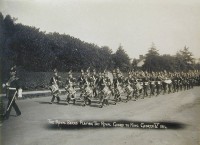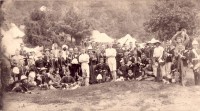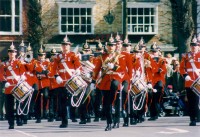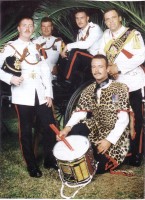Home of the Infantry Regiments of Berkshire and Wiltshire
Regimental Music
Strange as it might seem, from the rough and often frightful business of soldiering numerous pleasant musical customs have emerged to remind us of varied military episodes and associations. For many centuries commanders in battle communicated their orders through the medium of music. Not only on the field of battle but in barracks also, the soldier has to listen to the voice of the drum, bugle, trumpet or bagpipe for his orders, a musical custom that still persists. Regimental marches are, of course, an extremely mixed bag. Some are arrangements of traditional airs, some popular songs of the day, whilst others have been composed by famous musicians. Some of the reasons why certain tunes were used have been lost in the mists of time. We list below the Regimental marches and tunes used by our Regiments and where appropriate the words.
ROYAL BERKSHIRE REGIMENT
(Princess Charlotte of Wales's)
The Regimental March of the Royal Berkshire Regiment was written by General Burgoyne and composed by Sir Henry Bishop in 1810 during the period he was engaged as musical director of the Drury Lane Theatre. He was a prolific composer of stage work in the style of English ballad opera, and is remembered today for famous songs as Home, Sweet Home, My Pretty Jane and Lo, Here the Gentle Lark. He was knighted by HM Queen Victoria in 1842.

1st Battalion Royal Berkshire Regimental Band and Drums 1914.
Regimental March of the Royal Berkshire Regiment -
Dashing White Sergeant
If I had a beau
For a soldier who'd go
Do you think I'd say no?
No, no, not I!
When his red coat I saw
Not a tear would I draw
But I'd give him eclat for his bravery.
If an army of Amazons e'er came into play
As a dashing white sergeant I'd march away.
When my soldier is gone
Do you think I'll take on,
Or sit moping forlorn
No, no, not I!
His fame's my concern
How my bosom would burn
When I saw him return crown'd with victory!
If an army of Amazons e'er came into play
As a dashing white sergeant I'd march away.
Dashing White Sergeant
1st Volunteer Battalion, Princess of Charlotte of Wales’s (Royal Berkshire Regiment)
The 1st Volunteer Battalion used as a Regimental March ‘The Young May Morn’ when the Volunteer company paraded in front of Queen Victoria at Windsor in 1900 before departing for South Africa to join the 2nd Battalion in the Boer War.
THE WILTSHIRE REGIMENT
(Duke of Edinburgh's)
1st Battalion
For many years the 1st Battalion used a version of ‘the Lincolnshire poacher’ as its Regimental March. The original tune is an old Lincolnshire folk song. It is the Regimental March of the Royal Lincolnshire Regiment, who not unnaturally were most jealous of its use by other regiments. At some point a ‘directive’ was issued that regiments unconnected with Lincolnshire should not use the march. However the Wiltshire’s had used the march for so long, albeit in a slightly different version, that a blind eye (or preferably a deaf ear) was turned toward its continued use. Poachers are not exactly unknown in Wiltshire, and the march was played by the regimental band and referred to as ‘The Wiltshire Poacher’. In 1932, the 1st Battalion came up against a problem, for they were stationed with the Royal Lincolnshire’s in Shanghai. It was obvious that both regiments could not use the same march past, so the only course open was for The Wiltshire Regiment to gracefully relinquish, with many regrets, ‘The Lincolnshire Poacher’ and to be satisfied with our officially allotted ‘The Wiltshire’.
Regimental March 'THE WILTSHIRE'
'Twere on a jolly zummer's day, the twenty-fust o' May,
John Scroggins took his turmut-hoe, wi' thic he trudged away:
"Now zome volks they likes haymakin', and zome they vancies mowin'-
But of all the jobs as I likes best, gi'e I the turmut-hoein'."
Chorus
The vly, the vly,
The vly be on the turmut -
'Tis all me eye
Fer I to try
To keep vly off the turmut.
"The fust place as I went to work, it were wi' Varmer Gower:
Who vowed and swore as how I were a fust-rate turmut-hoer;
The second place I went to work, they paid I by the job -
But if I'd knowed a little 'afore, I'd sooner a' bin in quod."
Chorus
The vly, the vly,
The vly be on the turmut -
'Tis all me eye
Fer I to try
To keep vly off the turmut.
"The last place as I went to work, they sent fer I a-mowin',
I sent word back, I'd sooner take the zack, than gi'e up turmut-hoein'!
Now all you jolly varmer chaps wot bides at home so warm -
I'll now conclude my ditty wi' a-wishin' you no harm."
Chorus
The vly, the vly,
The vly be on the turmut -
'Tis all me eye
Fer I to try
To keep vly off the turmut.
The Vly
About 1900 the 1st Battalion played for marching past in Quarter Columns ‘Corn Rigs are Bonnie’. Again this is another Scottish connection that we believe came to the Regiment via the 99th Regiment (later 2nd Battalion)
Corn Rigs Are Bonnie
R. Burns
It was upon a Lammas night
When corn rigs are bonnie,
Beneath the moon's unclouded light
I held awa to Annie:
The time flew by wi' tentless heed
Till 'tween the late and early,
Wi' sma' persuasion she agreed to
See me thro' the barley.
Corn rigs an' barley rigs
Corn rigs are bonnie,
I'll ne'er forget that happy night
Amang the rigs wi' Annie.
The sky was blue, the wind was still,
The moon was shining clearly:
I set her down wi' right good will
Amang the rigs o' barley,
I kent her heart was a' my ain
I loved her most sincerely;
I kiss'd her owre and owre again
Amang the rigs o' barley.
Corn rigs an' barley rigs
Corn rigs are bonnie,
I'll ne'er forget that happy night
Amang the rigs wi' Annie.
I lock'd in my fond embrace,
Her heart was beating rarely,
My blessings on that happy place
Amang the rigs o' barley!
But by the moon and stars so bright
That shone that hour so clearly,
She aye shall bless that happy night
Amang the rigs o' barley.
Corn rigs an' barley rigs
Corn rigs are bonnie,
I'll ne'er forget that happy night
Amang the rigs wi' Annie.
I hae been blythe wi' comrades dear
I hae been merry drinkin';
I hae been joyfu' gath'rin' gear
I hae been happy thinkin';
But a' the pleasures e'er I saw,
Tho' three times doubled fairly,
That happy night was worth them a'
Amang the rigs o' barley.
Corn rigs an' barley rigs
Corn rigs are bonnie,
I'll ne'er forget that happy night
Amang the rigs wi' Annie.
This is one of earliest works of Robert Burns, mentioned in "The Gentle Shepherd" as early as 1725, and is said to have been inspired by either Annie Ronald or Annie Blair. It is sometimes known as "The Rigs Of Barley". The original words were somewhat less genteel than those which Burns eventually produced. The melody is of English origin and was composed in 1680 to a song by D'Urfey beginning 'Sawney was tall and of noble race'. It was later used by Alan Ramsey in 1725 and by John Gay in 1729.
2nd Battalion
The Regimental marches of the 2nd Battalion would certainly seem strange for the Wiltshire Regiment, being ‘vurrie, vurrie’ Scottish. Until you remember that the Battalion was until 1874, the 99th (Lanarkshire) Regiment of Foot, when they became The Duke of Edinburgh’s Regiment. In 1881 the title of the Regiments was again changed to the 2nd Battalion The Wiltshire Regiment. So we have the 2nd Battalion marching past to the old Scottish tune, ‘Blue Bonnets o’re the border, some of them drunk and some of them sober’ This was hummed by soldiers of the regiment for nearly one hundred and thirty years. The correct words are those of Sir Walter Scott on ‘The Border Ballads’.
Blue Bonnets Over the Border
March, march, Ettrick and Teviotdale,
Why the deil dinna ye march forward in order?
March, march, Eskdale and Liddesdale,
All the Blue Bonnets are bound for the Border.
Many a banner spread
Flutters above your head,
Many a crest that is famous in story.
Mount and make ready then,
Sons of the mountain glen,
Fight for the Queen and the old Scottish glory.
Come from the hills where your hirsels are grazing,
Come from the glen of the buck and the roe;
Come to the crag where the beacon is blazing,
Come with the buckler, the lance, and the bow.
Trumpets are sounding,
War-steeds are bounding,
Stand to your arms then, and march in good order;
England shall many a day
Tell of the bloody fray,
When the Blue Bonnets came over the Border

2nd Battalion Wiltshire Regimental Band and Drums at rest in India - 1883
The 2nd Battalion also had a regimental ‘fall in’ which the band commenced to play at ‘quarter –to’ and changes to a quick march when the first company approached the parade ground. It again was an old Scottish air ‘The Gard of old Gaul’ and is used by the Scots Guards as their slow march. The composer was General John Reid, who served in the Black Watch and later became an eminent Scottish composer.
On review order parades, the 2nd battalion would play the very likely Scottish tune ‘Kinloch o’ Kinloch’.
The Regimental slow march of the 99th was ‘Auld Robin Grey’ surly one of the most beautiful of Scottish tunes to be adopted for military purposes. The Wiltshire Regiment inherited it from the 99th Lanarkshire Regiment. It is an adaptation of the second (and more familiar) two tunes set to the words of the song Auld Robin Gray. The Rev William Greevers, a Somerset clergyman, composed the tune in 1772. He was an able composer and cellist, and before taking holy orders had served as an officer in the foot guards. The words of this old ballad were written by Lady Anne Lindsey – in memory it is said of an old family servant.
Auld Robin Grey
The 99th Regiment used ‘Points of War’, as a Regimental March at the presentation of new colours in 1841. The reason for this is not known.
3rd Militia (Special Reserve) Battalion Wiltshire Regiment
This battalion has its own Regimental March ‘I’m Ninety Five’. This tune was composed by an early bandmaster of the Rifle Brigade, Bandmaster W. Miller, and become a well known popular song of the day. It is not known why the Militia authorities chose this particular march. The same march was by the Rifle Brigade but at a much faster pace.
4th Battalion Wiltshire Regiment
The Territorial battalion always used the official Regimental March ‘The Wiltshire’. Although ‘The Wiltshire’ is the correct name of the march it is known to every Wiltshire man as ‘The Vly’ ‘on Thur Thurmut’. Wiltshire shares with Dorset the claim of this old country folk song with innumerable verses. Very few can recite all the words, thought most can bellow out at frequent intervals.
‘Thur vly-thur vly – the vly be on me turmuts,
Dang meoyes, thur more Oi troies,
Oi caant kep vlys art turmuts’
The ‘Vly’ was introduced into the Regiment by Lieutenant The Hon Stuart (Toby) Pleydell Bouverie of the 1st Wiltshire Volunteer Corps.
THE DUKE of EDINBURGH'S ROYAL REGIMENT
(Berkshire and Wiltshire)
REGIMENTAL QUICK MARCH - The Farmers Boy
The Regimental Quick March of the Duke of Edinburgh’s Royal Regiment was ‘The Farmers Boy’. It had connections with the former Regiments, The Royal Berkshire Regiment and The Wiltshire Regiment. As well as being indicative of the regiments origins and links with the south of England, ‘The Farmers Boy’ originated in North Oxfordshire as a folk ballad, and the tune is that of the patriotic song of the Napoleonic Wars ‘ To Sons of Albion’ It was collected and written down in 1909 by Janet blunt, the lady of Adderbury manor. She first heard it from the village singers at barn dances and harvest festival socials in Adderbury. The story combines the Christian ethic of good deeds and the promise of a better life, while the chorus emphasises the nostalgic pleasures of country life.

Regimental Band and Corps of Drums of the Duke of Edinburgh's Royal Regiment.
The Farmer's Boy
The Farmers Boy
The sun had set beyond yon hill,
Across the dreary moor,
When weary and lame, a boy there came,
Up to the farmer's door,
"Can you tell me whe'ere I be,
And one that will me employ,"
To plough and sow, to reap and mow,
And be a farmer's boy,
And be a farmer's boy?
The farmer's wife cried "Try the lad
Let him no longer seek".
"Yes Father do" the Daughter cried,
While the tears rolled down her cheek:
"For those who would work, 'tis hard to want
And wander for employ".
Don't let him go, but let him stay,
And be a farmer's boy,
And be a farmer's boy?
The Farmer's Boy grew up a man,
And the good old couple died,
They left the lad the farm they had,
And the daughter for his bride;
Now the lad that was, the farm now has,
Oft he thinks and smiles with joy.
Oh, happy day he came that way,
To be a Farmer's Boy,
To be a Farmer's Boy.
In recognition of the Regiments Royal Navy connections and former service as Marines’ ‘Rule Britannia’ was usually played immediately after ‘The Farmers Boy’ on formal occasions and parades.
Both the Royal Berkshires and the Wiltshire’s played Rule Britannia at the end of all band performances. It was instituted by the Royal Berkshire Regiment following the 49th’s participation in the Battle of Copenhagen in 1801 when Nelson was second-in-command of the British fleet.
The Wiltshire Regiment adopted the custom in commemoration of the 62nd Foot who, in 1758, were drafted to the Royal Navy for service as Marines and sailed in Admiral Boscwen’s fleet for the River St Lawrence in North America. Thomas Arne composed the patriotic song Rule Britannia in 1740 as part of the music for his masque Alfred, and the tradition was carried forward into the Duke of Edinburgh’s Royal Regiment.
Rule Britania
The Regimental Slow march of the Regiment was an old Scottish air ‘Auld Robin Grey’ which had been inherited from the former Wiltshire Regiment, and of the 99th (Duke of Edinburgh’s) prior to 1881.
WESSEX REGIMENT
The Regimental Quick March of the Wessex Regiment was the ‘The Farmer's Boy’, also ‘The Hampshire’ and ‘The Dashing White Serjeant’.
The Regimental Slow March was ‘God Bless the Prince of Wales’.
ROYAL GLOUCESTERSHIRE, BERKSHIRE and WILTSHIRE REGIMENT
QUICK MARCH - The Sphinx and Dragon
The Regimental march of the Regiment on its formation was ‘The Sphinx and Dragon’ composed by Bandmaster G. Clegg. Prior to entering Kneller hall as a student Bandmaster, Gary Clegg served as a bandsman in the Black Watch. On graduation from Kneller Hall as a Bandmaster in the 1992 Sir David Wilcocks class, he was appointed Bandmaster of the Gloucestershire Regiment band. Subsequently he became the Bandmaster of the Royal Gloucestershire, Berkshire and Wiltshire Regiment Band before its demise in 1994 as part of the army’s restructuring plan of army bands. He then became the bandmaster of the Prince of Wales’s Division Clive Band, one of the two Divisional Bands formed from eight former Regimental bands.
Sphinx and Dragon

Drum Major & Drummers of the RGBW in Tropical Dress - Cyprus.
‘The Sphinx and Dragon’ was later discontinued and replaced with Army of the Nile as the Regimental March in 1999
Army of The Nile
SLOW MARCH - Scipo
The RGBW slow march was ‘Scipo’. This stately tune came from Handles opera Scipio, which was first performed in London in 1726. Tradition relates, however that the composer wrote this as a parade march for the Grenadier Guards, long before it occurred to him to bolster up the somewhat tenuous score of his opera with its stirring strains.
Scipio
THE RIFLES
Mechanised Infantry
The Rifles Quick March is ‘Mechanised Infantry’ ‘and the Double past’ march (the music used when marching past at the double) is an amalgam of the Light Infantry (Keel Row) and the Royal Green Jackets (Road to the Isles).
The Slow march is ‘Old Salamanca’
Royal Berkshire Dashing White Sergeant